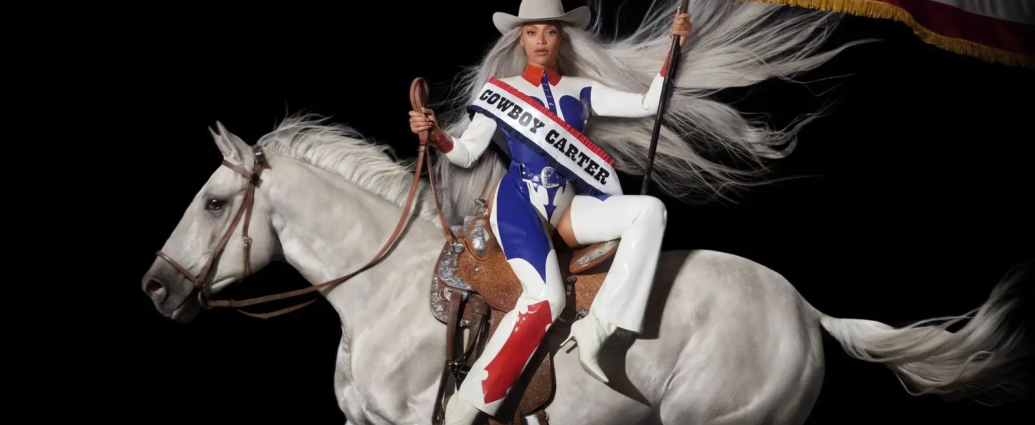Lucy Matthews
Beyoncé’s Cowboy Carter (2024) has broken records and awoken ghosts of country music’s past. However, there’s one fiery figure in particular who has resurrected debates online about pitting women against each other, instead of placing the blame where it’s rightfully due – is that person really Jolene?
The Other Woman?
Dolly Parton’s Jolene is a woman we have all come across. She is the Instagram model of today. Our boyfriends follow her in secret, and she’s the reason we secretly consider taking Ozempic. Her skin is “ivory,” and she has a voice as soft as “summer rain.”
While Parton goes fairly easy on the mystery Jolene, Beyoncé has a different relationship with the redhead. Whilst both songs have broken records in the music industry, each version contrasts their musical personalities interwoven in the lyrics. Parton implores Jolene: “I’m begging you…,” while Beyoncé snarls a caution: “I’m warning you…”
Where Parton found Jolene’s beauty beyond compare, Beyoncé barely addresses her beauty. Beyoncé tells Jolene to flip her red hair around her man as much as she likes – that’s her husband you’re talking about. Queen Bee compels her listeners to take umbrage with her. As Lemonade (2016) poignantly revealed, even Queen Bee has experienced her fair share of infidelity. This entitles her to a fair fight against Jolene. Though, Beyoncé’s rendition still fails to hold her man accountable for his cheating actions.
Whilst Parton begs for Jolene’s sympathy in the face of her lover’s infidelity, Beyoncé chooses a resilient family front instead of directly confronting her lustful man. It’s a firm contrast from Beyoncé’s previous song ‘Flawless’, where she features a segment of Chimamanda Ngozi Adichie’s TED talk on feminism: “We raise girls to see each other as competitors. Not for jobs or for accomplishments… But for the attention of men.”
Food For Feminist Thought
Every great tale has a multi-dimensional villain. Whether it’s the calculated Joker, or the twisted Norman Bates, the malevolent actions of these characters drive us crazy.
Then comes along Jolene. She may not be any Thanos, but she sure does have fiery locks of flaming hair and her superpower is taking other women’s men. Most specifically: Dolly Parton’s man, all the way back in 1973.
In 2024, songs that revolve around the actions of women seem to be taken much more seriously by society. They are often chastised far more than their male counterparts. The public response to Beyoncé’s ‘Jolene’ cover is an example of patriarchy’s obsession with pitting women against each other, wherever there is the faintest whiff of female rivalry.
— Dolly Parton (@DollyParton) March 29, 2024
Beyoncé’s ‘Jolene’ has given us food for feminist thought. It continues to prevent the blame of cheating men from landing in their laps, yet it has also found itself victim to pop culture’s pitting wars.
Fuelling a double standard in the music industry, women are often expected to “set a good example” for younger generations through their music. This limits them when it comes to what they can express without receiving any kind of backlash or commentary. Are we limiting Beyoncé’s right to self-expression by expecting all of her work to epitomise subjective, gold-standard feminism?
“Will Jolene’s spirit ever find peace, or will she always be the subjected to our misplaced blame?”
Even if Beyoncé fails to hold her cheating man to account, it’s not totally her responsibility to uphold a golden example of a “good woman.” When society only holds female artists’ work to the standard of being a “good woman,” it undermines their artistic free will. Beyonce should not have to put her artistic story on the line, just for the sake of being deemed a “respectful woman” by those listening.
This is a form of silencing which doesn’t reflect the raw and honest picture that Beyonce is painting across the entire album. After all – the authenticity of an artist is their greatest asset. It’s what draws listeners to them in the first place.
An Almighty Send Off
Beyoncé imbues the ending to her ‘Jolene’ with almighty resilience. The powerful “I’mma stand by him, he gunna stand by me” lyricism hammers home a determined approach to female competition.
This is in direct genre contrast to Parton’s polite but pleading take on the matter. By taking an empowering approach to a figure that can prompt insecurity in relationships, Beyoncé puts Jolene in her place. Whilst providing a powerful example of assertiveness and self-confidence in comparison to Parton, it still points the finger at the wrong person in the picture. She is seemingly standing by a man who should be the one questioned for his acts of infidelity.
Where Parton’s Jolene is happily settled with the man she wooed with her flaming locks, Beyoncé has Jolene running for the mountains. It all begs one question. Will Jolene’s spirit ever find peace, or will she always be the subjected to our misplaced blame?
READ NEXT:
-
ARIANA GRANDE SETS THE RECORD STRAIGHT ON ETERNAL SUNSHINE
-
TRACK BY TRACK OLIVIA RODRIGO’S ‘GUTS (SPILLED)’
-
WOMEN IN THE “MANOSPHERE” ARE BETRAYING THEIR GENDER
Featured image courtesy of Brett Jordan via Flickr. No changes were made to this image. Image license found here.

